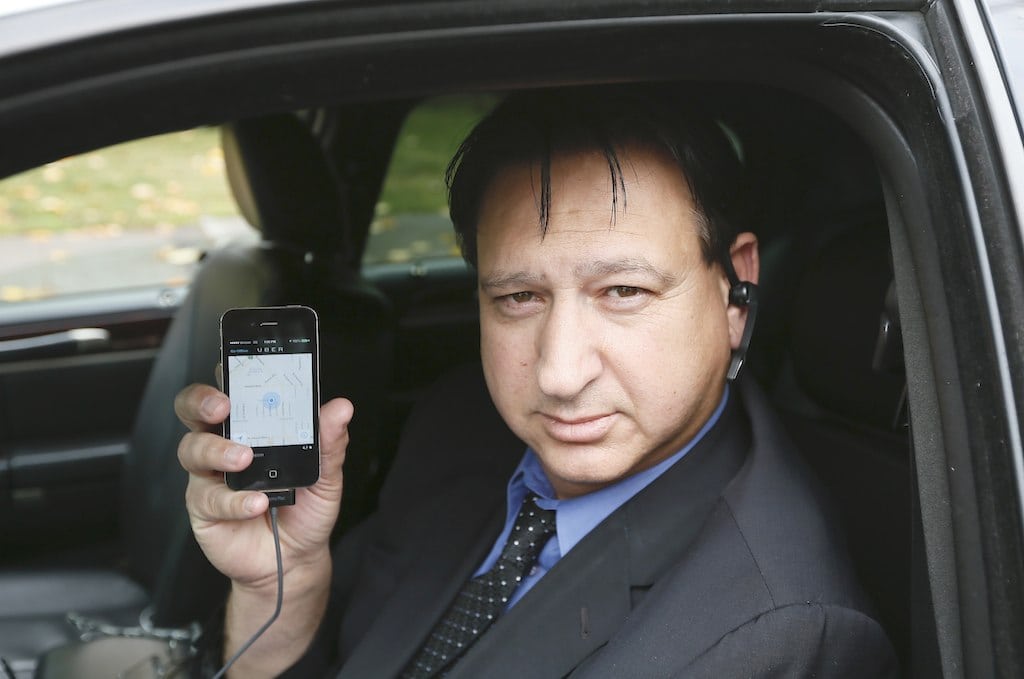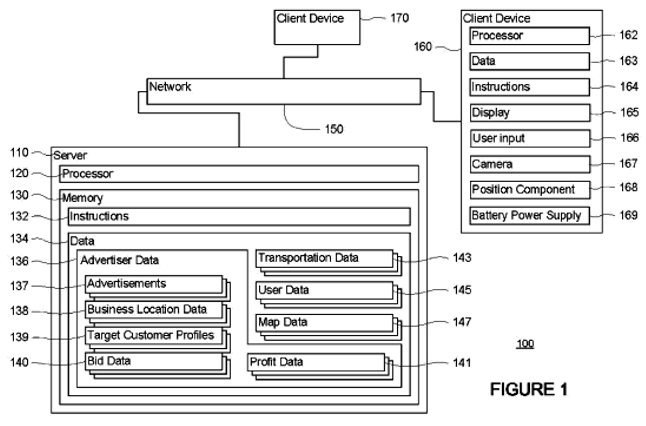Skift Take
Did Uber's valuation just tick up a billion dollars or so? Google's patent for transportation-aware restaurant ads coupled with free taxi service turns online ads into a concierge service of sorts that will deepen ties between taxi services and restaurants and other businesses.
Google has secured a U.S. patent that could revolutionize the way restaurants and other retail outlets use online advertising. The patent enables these businesses to turn their online ads into a utility that provides prospective customers with free or discounted taxi service to get to the venue.
The patent for “Transportation-Aware Physical Advertising Conversions” shows that Google would parse the advertiser’s business location, customer GPS data, target customer profiles and user data, as well as Google Maps, and calculate the cost of transportation and the advertiser’s potential profit for providing free or discounted taxi service to the advertiser’s business.
“For example, the system may consider various factors including a consumer’s current location, the consumer’s most likely route and form of transportation (such as train, personal car, taxi, rental car, or shared vehicle), the consumer’s daily agenda, the price competing advertisers are willing to pay for the customer to be delivered to alternate locations, and other costs,” the patent says.
“In this regard, the customer’s obstacles to entering a business location are reduced while routing and cost calculations are automatically handled based on the demand for the advertiser’s goods and potential profit margins.”
This patent thus marries big data, including advertiser data and user data, to offer highly personalized online and mobile ads that would increase conversions for restaurants and other businesses, and remove the hassle for the consumer in getting to the business location.
The patent outlines how the transportation-aware advertising would benefit businesses and consumers in a tourism destination such as Las Vegas, where retailers currently pay referral fees, hidden from the public, to transport customers to restaurants, shows, and other venues and events.
A drawing that accompanies Google’s U.S. Patent 8,630,897
“In more well-developed and trafficked locations, for example the Las Vegas area, some transportation companies may arrange referral fees for directing customers to specific locations such as restaurants. However, these systems do not provide a reliable infrastructure for many transportation vendors or advertisers to compete and cannot make specific calculations about the desirability of a given customer to a particular business in real time.
“These referral arrangements may be done privately or in secret rather than via transparent auctions. Thus, these services may exist at the expense of consumers who are paying for the cost of the transportation without realizing that the transportation company is also receiving a referral fee. In addition, this approach also requires a critical mass of consumers in a specific geographic area and well-defined transportation systems, and it may rarely scale across significant distances.”
The BBC points out that the patent turns online and mobile ads from a mere come-on into a utility for consumers.
In other words, a restaurant ad would not only tout its filet mignon, but it would provide some meat on the bone by delivering customers from the nearby hotel, street or business meeting right to the restaurant’s maitre d at little or no extra charge.
Google already has close ties with Uber, the ride-sharing service, and you can envision Uber partnering with additional restaurants around the country as Google helps advertisers deliver customers right to their doorsteps.
And, if you really want to get futuristic, then Google’s driverless cars would be a fit for these location-aware transportation ads, as well.
You can also expect restaurants, including those operating in hotels, to deepen their ties with taxi services, and even acquiring some as relationships deepen.
Targeting and personalization in advertising is already here, and Google’s transportation ads for discounted or free taxi service would increase advertisers’ effectiveness, and make life easier for foodies and others trying to get from point A to point B.
The Daily Newsletter
Our daily coverage of the global travel industry. Written by editors and analysts from across Skift’s brands.
Have a confidential tip for Skift? Get in touch
Tags: advertising, big data, google, taxis, uber
Photo credit: Limousine driver Shuki Zanna, 49, holds up his iPhone displaying transportation app Uber as he waits for customers in Beverly Hills, California, December 19, 2013. Lucy Nicholson / Reuters

